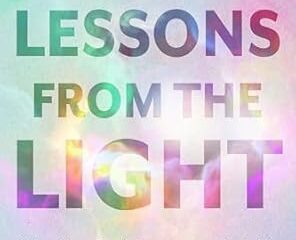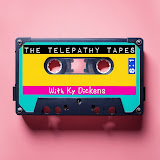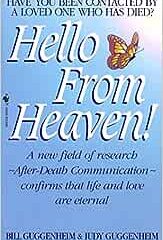Love and the Afterlife: How to Stay Connected to Your Human and Animal Loved Ones
AUTHOR: Julie Beischel, PhD
PUBLISHED: 2023
MY COMMENTS:
Are you interested in what SCIENCE has to say about an afterlife?
And not only whether our loved ones continue to exist after the body dies, but whether our relationships with them … our bonds of love … continue as well?
Uh, hello?? WHAT DID YOU JUST SAY??
Oh, hi, you again. I wasn’t expecting you to show up since this post is, you know, just a book review really.
Yeah, but you said something about SCIENCE talking about the “afterlife” and “LOVE” and stuff like that. Hah, hah! I don’t think so!
No, I’m quite serious. This book is about science weighing in on the idea that we and our loved ones can actually maintain an ongoing relationship, based on love, after they leave this world.
Yeah, right. And since when do “scientists” talk about “l-u-u-u-v”? Yuuch.
I realize it’s not typical. In fact, I recall recently watching an interview with this book’s author and scientist, Julie Beischel PhD, in which she kind of said the same thing (and I’m paraphrasing) …
“As a scientist, I really hate using the word ‘love,’ but I have to follow the data ….”
And according to her, the data provide evidence to support two mind-blowing revelations …
First, the emerging theory that consciousness is not produced by the brain as we’ve been taught, but rather that it operates independently of the body, continuing to exist after the body dies.
And second, that even after our loved one dies, we can maintain a relationship with them … because the bonds of love continue from this world to the next.
She draws on her own research and also that of many others to lay out this case.
Um, wow, those really are mind-blowing, and frankly incredible … meaning NOT credible! I mean, seriously, just what is ALL this “evidence” that supposedly exists??
Well, if I could tell you that, I’d be the one publishing a book now, wouldn’t I?
Oh. So what you’re saying is, read the book. Well, maybe I will! But first …
Just who is this Julie Beischel, PhD?
Who is this “scientist author” and why should I believe her? Just because she has a “PhD” doesn’t mean she knows anything about science.
Fair question. Let me tell you about Dr. Julie Beischel and why she has the credibility to pull off a publication like this.
Let’s start with her PhD, received in 2003 from the University of Arizona. Get this … it’s a PhD in Pharmacology and Toxicology, with a minor in Microbiology and Immunology.
Yikes, that’s a lot of “ologies” … !
Right? So, she’s steeped in science and the scientific method.
Hmm, yeah, not like a PhD in history or whatever. Not that there’s anything wrong with that ….
No indeed. But you’re right, it’s not the same. Her education immersed her in science and she takes the scientific world very seriously.
According to her CV …
I peeked at her resume for these past 20 years and it’s very “science-y.” For example, she’s published a number of those highly touted “peer-reviewed” articles and such … 36 of them, in fact.
She’s also been a sought-after speaker about her research … speaking at almost 50 events and conferences.
She’s received a bunch of grants (which apparently is a big deal in the science community) … has done a litany of formal teaching in science subjects … and has been a council and advisory board member for three science-based associations.
So, you mean she’s not just an academic, she’s actually done a bunch of, you know, “real” science ….
Exactly. And that’s not all …
Director of Research too!
She’s also the co-founder and Director of Research for an organization that is doing amazing things … Windbridge Research Center (WRC).
Oh, I remember them. They’re the non-profit organization whose mission is “to ease suffering around dying, death, and what comes next.”
Well, aren’t you full of surprises! How’d you remember that?
You’ve mentioned them before … like a million times.
A million? Hah! Now, you see, that’s just the kind of thing Beischel wouldn’t say. She only writes about what she has the data to support.
And she has lots of data. You see, the way WRC tackles their mission is by performing and sharing rigorous scientific research about related topics, including end-of-life stuff, tackling fear of death, and treating grief.
In fact, one of their most interesting research discoveries is the role psychic mediums play in all this.
Seriously? The people who “supposedly” talk to dead people?
Precisely. This has been one of their most significant areas of research. I talked about it in a recent post, “Mediumship – For the Left-Brained (Part 2).“
But here’s the thing … though some of this may sound like “fringe” science, they actually have an impressive Scientific Advisory Board overseeing it all, specifically to make sure what they do is truly “real” science.
Hmm, interesting ….
You can check out an earlier post for more about WRC. But the key point here is Beischel’s role there. As Research Director, she’s naturally the research brains behind it all.
And she brings all of this, plus more, to this book.
Hmm, I get it. She seems to be the “real deal” ….
Tell me more about the book
So, you’re saying this book lays out evidence that consciousness is not an “inside job” like I’ve always been told? It’s not stored in my brain and will actually keep on keepin’ on … somehow and somewhere … after I die?
Yes.
And while I’m still here, I can actually, uh, “stay in touch” with the people I care about after they, you know, die?
Exactly.
Wow, that’s food for thought ….
Good choice of words because Beischel includes many thought-provoking topics in this book, such as …
How is an afterlife possible?
She starts by laying the groundwork for the existence of an afterlife by tackling the question, how is an afterlife even possible?
Yeah, that’s what I want to know!
Of course you do … and you’re far from the only one. (Just talk to my retired engineer husband!)
As one part of this, she lays out the case for something which lies at the core of what makes an afterlife possible, which is this … we are not our body.
What do you mean I’m not my body?? Of course I am! I mean, if I’m not, then what the heck am I?
Believe me, you’re not alone in thinking this way. Identifying ourselves with our body is a common misconception we’re all raised with. You may recall I introduced this idea of “not being our body” in a recent post.
That wasn’t the time or place to delve into the scientific support for it, but this book is. And Beischel does an effective job of explaining it. It’s really quite fascinating.
Moving on to those Continuing Bonds
Once she’s laid the scientific foundation for the afterlife, she moves on to the core theme of the book.
She asserts, again with supporting evidence, that the love we have in this world carries with us to the next … and these bonds between us and our departed loved ones (or DLOs, as she calls them) remain unbroken.
A comforting thought, sure, but even if I believed it … which still sounds completely far-fetched by the way … why is a scientist focusing so specifically on this point? You know, that “love” and relationships continue after death?
Because research shows … and this is important … experiencing these continuing bonds helps to alleviate suffering brought on by grief. It makes people feel better at a time when the impact of loss can be absolutely crushing.
And that’s what Beischel and the WRC are all about, remember? Reducing suffering.
Right. But wait … don’t you have to first believe there IS an afterlife for all this to work? I mean, without an afterlife, there’s obviously no ongoing relationship, right?
That’s an amazing part of this. Apparently, it doesn’t actually matter. The evidence shows that even trying to communicate with your departed loved one alleviates suffering … whether or not you believe in an afterlife. Cool, eh?
I think I need to learn more about this ….
How to maintain relationships with DLOs
After that, most of the rest of the book is spent on how to do this.
Do what?
Maintain the ongoing relationships we’re talking about, the ones with your DLOs (departed loved ones). And the way to maintain these relationships is fundamentally the same as in any relationship … you have to communicate.
So, Beischel devotes considerable time in this book describing how to do just that … how to have after-death communication (ADC).
Oh! They didn’t teach THAT in high school English ….
Indeed. Yet interestingly, it appears there are actually many ways to have this communication. Beischel explains them all, categorizing them into four different types of ADCs.
As it happens, one of these types of ADCs was the focus of my last post, about the book “Signs.” These are the messages that come spontaneously, out of the blue.
You mean like when my buddy’s favourite song started to play on the radio just as I was thinking about him … ?
Exactly. In fact, when we pay attention, we begin to see these happen all the time.
ADCs through Mediumship
Another type of ADC Beischel addresses comes from the field she and the Windbridge Research Centre have researched extensively … mediumship. She describes using psychic mediums to help receive and interpret after-death communication from loved ones.
Since she’s been performing controlled laboratory research into this for 20 years, it’s the type she knows most about, so she writes the most about it. It’s all super interesting, but I particularly appreciate how she approaches mediumship as a therapeutic intervention.
You mean, not just something fun to do at a party … ?
Precisely. She does an effective job of treating it as the serious endeavour it’s meant to be, devoting multiple chapters to how to get the most out of it … sharing what we can do before, during, and after a reading.
She also talks about a third type of ADC that involves using a trained facilitator, and a fourth type in which you simply reach out to your DLO yourself. Remember earlier this year, I described using this last type in the “Meet Up At Your Funeral … ?” posts.
Oh yeah, I do, that was pretty cool. Boy, I had no idea there were so many ways to stay in touch with my … um, DLOs.
Right?
DLOs of the four-legged (two-winged) variety
By the way, she’s also very clear that DLOs aren’t just human in nature.
Seriously?
Yes, she spends an entire chapter on our animal DLOs too. In fact, reading this chapter brought a personal experience to mind.
Only weeks after my first husband died, I was talking to a very thoughtful and considerate contractor who was helping me finish a challenging project.
His dog had just died over the weekend and he was deeply grieving his loss. Having my own four-legged family members at the time, who were completely indispensable to me, I reeled at the thought, telling him …
“I just can’t imagine …. “
Being aware of my personal situation, he responded with surprise …
“In fact, I’m sure you can.”
I had to give my head a shake … duh. Of course he was right. Having just lost my husband, the love of my life, absolutely I should have been able to imagine a profound loss. But interestingly, I didn’t equate the two. The loss of a pet was its own special and deep loss.
I know I’m not alone in feeling this way. Perhaps even you understand ….
Sniff, sniff … I was just remembering Fido … sniff.
Exactly. And, uh, sorry. But it’s why Beischel digs into this topic, and also includes evidence demonstrating that animals too have consciousness (something I’ve previously written about in my “Rainbow Bridge” posts).
Why don’t we know about all this?
So, if there’s all this evidence we can keep in touch with our loved ones after they die, and it can actually make us feel better, then, well … why don’t more people know about it??
Very good question … and one Beischel has too. She points out …
“In our modern Western culture, we receive absolutely no organized training about how to continue our relationships with our loved ones who have died.” (pg. 169)
Apparently, it’s one of the most effective ways to alleviate often indescribable grief over the loss of a loved one, and yet we’re taught nothing about it. Go figure.
However, instead of just complaining about this state of affairs, Beischel’s trying to help change it … both with this book and with all the research WRC publishes (for free). Particularly the write-ups for people like us and for professional therapists.
But she’s a scientist … will I understand this book?
Okay, one last point. A book by a scientist ALWAYS leads to the ultimate question … am I going to be able to understand it? You know, writing is not always their, uh, forte, if you get my drift.
I do, and I’ve been there. However, there’s good news on this front. Unlike many other serious scientists whose books I’ve read, Beischel has an engaging writing style … personable and folksy. Except when it requires more technical content, but she keeps those descriptions fairly short.
Oh, good.
Overall, I found her explanations to be clear, objective, and no-nonsense, often with a little humour added in for good measure. But I did get a chuckle over how her “science-y” nature would slip through from time to time (like preaching lessons on how or how not to use certain terminology … lol).
She also is adamant about her scientific credentials and approach, and expresses her frustration with closed-minded cynics. This leads to one short f-bomb-laced paragraph early on, but don’t let this throw you off as it’s not reflective of the rest of the book. (Although, I have friends who say it makes them want to read it even more, so to each their own!)
The bottom line … ?
I think Beischel very effectively summarizes “Love and the Afterlife” with this statement …
“In this book, I have provided what some might call overwhelming, irrefutable, and even awe-inspiring evidence that your loved ones continue to exist in the afterlife and that the love you have for each other will keep you connected until you meet again.” (pg. 343)
Wow.
Yup. Enough said.
Let’s Share
There are so many ways we can connect with our departed loved ones … spontaneously through a variety of signs, with the assistance of a psychic medium, under the guidance of a trained therapist, or by simply reaching out to ask.
What after-death communication experiences have you had? I encourage you to tell us about them in the Comments section below.
To sign up for notifications of future posts, click here.



0 Comments